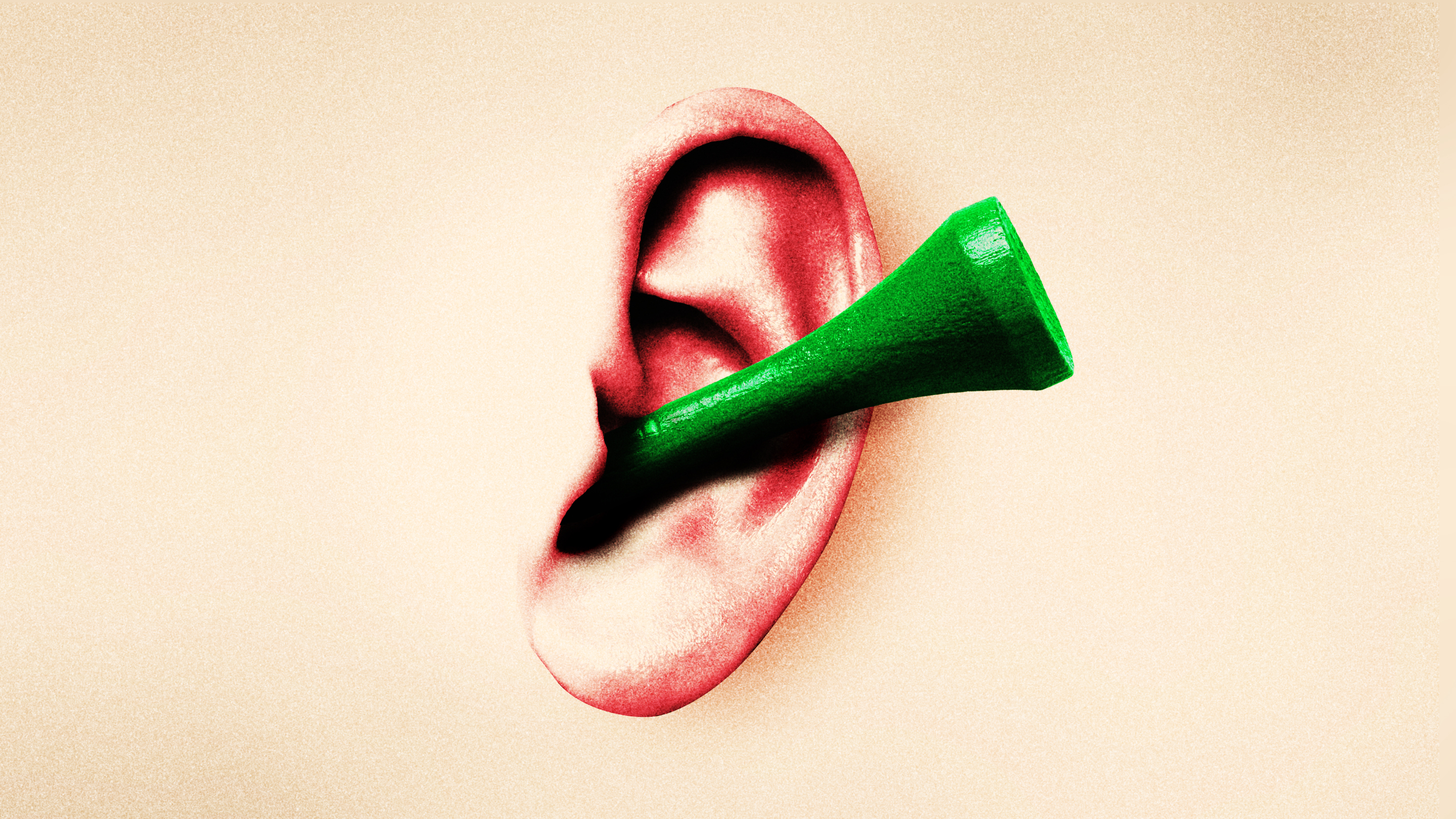This is an edition of The Atlantic Daily, a newsletter that guides you through the biggest stories of the day, helps you discover new ideas, and recommends the best in culture. Sign up for it here.
The ascent of MAHA—the Trump administration’s movement to “Make America Healthy Again”—is part of a broader health revolution in the United States, one that venerates the past in order to carve out a purportedly healthier future. It has had mixed results; some MAHA tenets have little basis in medical literature (researchers pushed back on the White House’s announcement this week that Tylenol use during pregnancy could be linked to autism). In today’s Daily, my colleague Elizabeth Bruenig joins me for a conversation about her new article, “When Child Death Was Everywhere,” and the philosophy of the man behind the movement, Health and Human Services Secretary Robert F. Kennedy Jr.
Will Gottsegen: How does the ideology of conservatism explain what Robert F. Kennedy Jr. is trying to do with health policy?
Elizabeth Bruenig: When you think of conservatism, you’re thinking basically of someone who wants to conserve. William F. Buckley Jr. said the conservative disposition “stands athwart history, yelling Stop.” I think that helps explain why RFK Jr., who was a lifelong liberal, wound up on the conservative side of things. He, like a lot of conservatives, feels that the answer to human health and happiness lies somewhere in the past. It’s a kind of nostalgia that drives what he’s doing.
Will: Wasn’t that nostalgia for a supposedly healthier time once the province of the left?
Liz: Vaccine skepticism was for a long time associated with the left, because it was associated with people who were skeptical of Western medicine or had a kind of “back to the earth” belief system that advocated holistic treatments and rejected modern pharmacology. Over time, anti-vax sentiment became more bipartisan, and then, after COVID, it just exploded on the right without exploding on the left.
Will: Americans’ trust in institutions such as HHS and the CDC declined majorly after COVID, on the right and the left. Is that how you wind up with someone as skeptical of the medical establishment as RFK Jr.?
Liz: I think it’s how you wind up with so many people who are interested in RFK Jr.’s message. RFK Jr. was already anti-vax by the time the pandemic came around, but what COVID changed is it created so many people who had serious doubts about our institutions. And I think that explains why you have so many people at this point who are willing to listen to an anti-vax message.
Will: You describe a lot of what RFK Jr. is doing as an unwinding of old policies, or a vision of return to an earlier era. What are the wrongs he’s looking to right? And is there a way in which he’s reacting to specific policies?
Liz: RFK Jr., if you look at his career, is someone who has focused on the purity of nature: protecting the purity of natural resources, clean water, protecting pristine natural sites from industrial pollution. So I think his view on vaccines and processed foods is all of a piece with everything else he’s done to try to keep things pure and natural. I do think that he is responding to the CDC’s actions during COVID. A lot of people wound up very disillusioned with the lockdowns, with the mask mandates, and so on. And RFK Jr. is very much capitalizing on that mistrust people developed of the CDC.
Will: To what extent is this broad skepticism now self-sustaining? Will we even need RFK Jr. to keep the wheels turning?
Liz: I’m afraid that we won’t. At this point, it’s become part of the belief system of the right, especially the MAGA right—just like how post–Donald Trump, we’ll still be dealing in some sense with the MAGA movement, because it’s changed how conservatives think about politics. We will still see right-wing anti-vax sentiment even after RFK Jr. is gone. You can see the impacts on people who are questioning all kinds of received wisdom about what you should put inside your body. RFK Jr., for instance, is a raw-milk guy. Raw milk is another area that’s begun attracting more attention as this marginal practice has leaked into mainstream culture. And that’s disturbing, because that kind of stuff can kill people.
Will: You talk about how the modern medicine that we now take for granted has lulled Americans into a false sense of security, which allows some people to view the past in a naive way. What might it take to wake people up, short of something like a widespread measles outbreak or the return of polio?
Liz: I think about that a lot. And I wonder what could earn people’s trust back in our health-care institutions and in medical expertise in general. I do think that it would have to be related to a major medical advancement, where it’s impossible to deny the good of medical expertise. It’s hard to think about what kind of advancement would win back trust. And this is why I think the likelier scenario will have to do with some kind of measles outbreak—or something even worse than measles.
Related:
Here are three new stories from The Atlantic:
- Why is the Pentagon afraid of the press?
- Fentanyl doesn’t come through the Caribbean.
- Quinta Jurecic: The Comey indictment is an embarrassment.
Today’s News
- Former FBI Director James Comey was indicted last night by a federal grand jury for allegedly lying to Congress and obstructing a congressional proceeding, amid growing pressure from President Donald Trump to prosecute his political adversaries. Comey has denied any wrongdoing.
- Sinclair, the broadcast-station owner that removed Jimmy Kimmel Live from air, announced that its ABC affiliates will start broadcasting the show again. The company said that its decision to take Jimmy Kimmel off the air was “independent of any government interaction or influence.”
- In an address to the United Nations General Assembly, Israeli Prime Minister Benjamin Netanyahu rejected the idea of a Palestinian state and reaffirmed Israel’s military campaign against Hamas. Representatives from dozens of countries walked out of the hall before Netanyahu’s speech.
Dispatches
- The Books Briefing: In Patricia Lockwood’s new novel, the main character gets so ill that she wonders whether she’s become a different person, Maya Chung writes.
- The Weekly Planet: Kylie Mohr writes about how Trump is setting the national parks up to fail.
Explore all of our newsletters here.
More From The Atlantic
- Jonathan Chait: The emptiness of attacking critics for their hypocrisy
- David Frum: The Comey indictment is not just payback.
- Autocracy in America: The fraught role of the military in a weakening democracy
Evening Read

Golf’s Very Loud Weekend
By Sally Jenkins
Give a guy from Bushwick several hours to day-drink and a chance to yell on Rory McIlroy’s backswing, and it’s going to happen. Garrulous and unseemly noises always seem to break out whenever golf and New Yorkers are adjacent. The organizers of the Ryder Cup have nevertheless brought the famously contentious event to Bethpage Black this weekend for the first time. This municipal course is just 33 miles from Manhattan, setting the stage for a sub-contest: How badly will etiquette collapse in the blood-rush of patriotism, combined with New York sarcasm, concessionaires peddling a vodka-and-grape-juice cocktail named the All-American Transfusion, corporate tents packed with bayingly overserved Wall Street wolves wreathed in Padrón smoke, and the carrack-carrack of packed trains carrying an expected 225,000 comers from across the boroughs and beyond?
Culture Break

Read. Fifty years after the initial release of Judy Blume’s Forever, Anna Holmes remembers her first encounter with the novel.
Listen. The band Geese, with its new album, Getting Killed, has achieved something miraculous for 2025: It’s pushed rock and roll in a new direction, Spencer Kornhaber writes.
Rafaela Jinich contributed to this newsletter.
When you buy a book using a link in this newsletter, we receive a commission. Thank you for supporting The Atlantic.
The post RFK Jr.’s Obsession With the Past appeared first on The Atlantic.




